War and Genocide
War and Genocide
A Concise History of the Holocaust
Third Edition
Doris L. Bergen
ROWMAN & LITTLEFIELD
Lanham Boulder New York London
Published by Rowman & Littlefield
A wholly owned subsidiary of The Rowman & Littlefield Publishing Group, Inc.
4501 Forbes Boulevard, Suite 200, Lanham, Maryland 20706
www.rowman.com
Unit A, Whitacre Mews, 26-34 Stannary Street, London SE11 4AB, United Kingdom
Copyright 2016 by Rowman & Littlefield
First edition 2003. Second edition 2009
All rights reserved . No part of this book may be reproduced in any form or by any electronic or mechanical means, including information storage and retrieval systems, without written permission from the publisher, except by a reviewer who may quote passages in a review.
British Library Cataloguing in Publication Data
Library of Congress Cataloging-in-Publication Data Available
Bergen, Doris L., author.
War and genocide : a concise history of the holocaust / Doris L. Bergen.
Description: Third edition. | Lanham : Rowman & Littlefield, 2016. | Includes bibliographical references and index.
Identifiers: LCCN 2015043500 (print) | LCCN 2015044038 (ebook) | ISBN 9781442242272 (cloth : alk. paper) | ISBN 9781442242289 (pbk. : alk. paper) | ISBN 9781442242296 (electronic)
Subjects: LCSH: GermanyHistory19331945. | National socialism. | AntisemitismGermanyHistory20th century. | Holocaust, Jewish (19391945)Causes. | World War, 19391945Causes.
Classification: LCC DD256.5 .B3916 2016 (print) | LCC DD256.5 (ebook) | DDC 940.53/18dc23
LC record available at http://lccn.loc.gov/2015043500
 The paper used in this publication meets the minimum requirements of American National Standard for Information SciencesPermanence of Paper for Printed Library Materials, ANSI/NISO Z39.48-1992.
The paper used in this publication meets the minimum requirements of American National Standard for Information SciencesPermanence of Paper for Printed Library Materials, ANSI/NISO Z39.48-1992.
Printed in the United States of America
CONTENTS
M any people contributed to this book in countless ways. I appreciate everyone who helped with the previous editions, and in the meantime, have incurred new debts of gratitude. Students in my classes at the University of Toronto continue to educate and inspire me. I have also benefited from the undergraduate and graduate students, professors, teachers, and members of the public I encounter through the Holocaust Educational Foundations Summer Institute on the Holocaust and Jewish Civilization at Northwestern University, the Genocide and Human Rights University Program, the Hess and Silberman seminars at the U.S. Holocaust Memorial Museum, Facing History and Ourselves, the Neuberger Holocaust Education Centre, and Torontos Holocaust Education Week.
In Toronto some wonderful teaching assistants, many of them now professors, have deepened my understanding of the Holocaust and the challenges of teaching about it: thanks to Tatjana Lichtenstein, Tomaz Jardim, Rebecca Carter-Chand, Sophie Roberts, Ryan Masters, Vojin Majstorovic, Deborah Barton, Susan Papp, Tomasz Frydel, Maris Rowe-McCulloch, Stephanie Corazza, Nisrine Rahal, and Joanna Krongold. I am also grateful to Martina Cucchiara, Steven Schroeder, Glen Ryland, Elizabeth Strauss, Nina Paulovicova, Max Bergholz, Jon Soske, Anna Hjkov, Svitlana Frunchak, Carson Phillips, Birga Meyer, Yaron Pasher, and Stacy Hushion for all I learned from reading their work.
At Toronto I have the privilege of learning from, and in some cases teaching with, remarkable colleagues: thanks to Sol Goldberg, Jeffrey Kopstein, Jacques Kornberg, Mark Meyerson, Melanie Newton, Derek Penslar, Jim Retallack, Rebecca Wittmann, Piotr Wrbel, and Lynne Viola. Even a special thank you cannot convey how much I owe to Michael Marrus and Anna Shternshis, two incredible scholars and cherished friends.
Many people provided corrections, comments, practical assistance, and insights that helped me revise, and I hope improve, the book. I gratefully recognize the following and acknowledge others I may have forgotten to mention: Frank Bajohr, Seth Bernstein, Peter Black, Daniel Blatman, Christopher Browning, Laura Crago, Susan Crane, Alexandra Garbarini, Norman Goda, Gary Hamburg, Elizabeth Heineman, John-Paul Himka, Michaela Hoenicke-Moore, Sara Horowitz, Mark Jantzen, Uta Larkey, Andrea Lw, Semion Lyandres, Jrgen Matthus, Geoffrey Megargee, Dan Michman, David Oliver, Mark Roseman, Naama Shik, Vincent Slatt, Scott Spector, Nathan Stoltzfus, Barry Trachtenberg, and John Williams. Thanks also to Rafa Witkowski and Miosz Sosnowski, superb historians who translated my book into Polish and drew my attention to some issues that needed rethinking. Patricia Heberer-Rice deserves extra thanks for answering my questions about euthanasia killing sites and much more; Paul Jaskot challenged me to think harder about photographs and then generously helped me do so.
Three anonymous readers for the press provided encouragement and valuable suggestions. Thanks to the conference in Poland organized by Andrzej Kaminski, Recovering Forgotten History: The Image of East-Central Europe in English-Language Academic Textbooks, I received incisive and extremely useful feedback from three Polish academics: Grzegorz Berendt, Pawe Skibiski, and Jakub Tyszkiewicz.
As research assistants on this project, Madeline Klimek, Jaclyn Buckley, and Ryan Masters have been absolutely brilliant, each in their own way. Thank you all, and thanks also to the Social Science and Humanities Research Council of Canada and the Chancellor Rose and Ray Wolfe Chair of Holocaust Studies for the necessary funding. And what would I do without the support and kindness of Galina Vaisman and Emily Springgay at the University of Torontos Anne Tanenbaum Centre for Jewish Studies?
Michael J. Fisher, cartographer, went above and beyondand then beyond thatto make the maps. Everyone at the U.S. Holocaust Memorial Museum Photo Archives was wonderful: Judith Cohen creatively and generously shared her vast knowledge, and Caroline Waddell Koehler has been enormously helpful. It is a pleasure to work with Rowman and Littlefield: Audra Figgins has efficiently and enthusiastically guided this book though the production process, and Susan McEachern, in my view, is the perfect editorpatient, persistent, flexible, firm, insightful, informed, and encouraging in all the right ways. I am deeply grateful to her.
I am very lucky to have some friends who know a lot about the subject of this book and are always willing to discuss it with me. Thank you to Daniel Mattern, Catherine Schlegel, and Linda Pardo! Thanks also to my son, Arlo Harink, for making me laugh. Finally I want to acknowledge some extraordinary people who have shared with me, and through this book with you, the readers, their profound knowledge and personal experience of the Holocaust: Sara Ginaite, Livia Prince, Gerhard Weinberg, and the late Henry Friedlander. This book owes so much to them. Its failures and shortcomings, however, are my responsibility.
Note: USHMM is the United States Holocaust Memorial Museum.
Cover
Introduction
Chapter 1
Chapter 2
Chapter 3
Chapter 4
Chapter 5
Chapter 6
Chapter 7
Chapter 8
Chapter 9
Conclusion
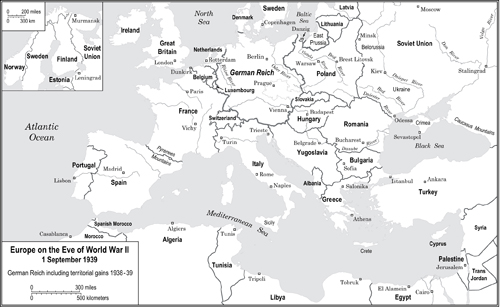
T his book makes four major claims about the Holocaust. (1) The Holocaust was an event of global proportions with worldwide repercussions. Any effort to grasp it in its entirety must begin with recognition of that massive scope. (2) The Holocaust happened step by step. It occurred over time, as a process with no easily determined beginning or end. (3) Intertwined with World War II, the Holocaust needs to be understood in the context of that conflict. Without the war, the Holocaust would notand could nothave happened. (4) Jews were the primary targets of Nazi German destruction, but their fates were linked with those of other victim groups: people with disabilities, Roma and Sinti, Polish elites, Soviet prisoners of war, and homosexual men.
Next page
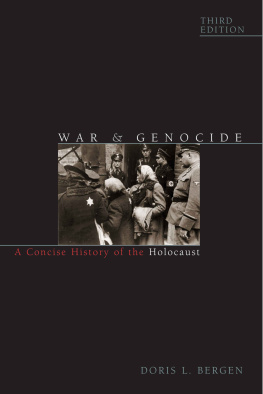
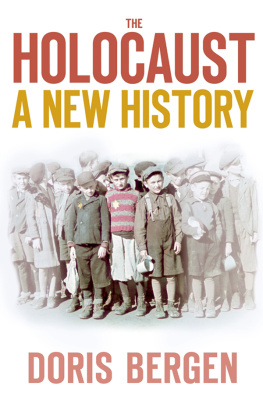
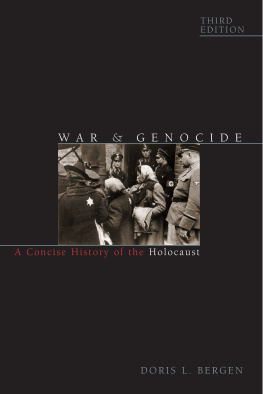

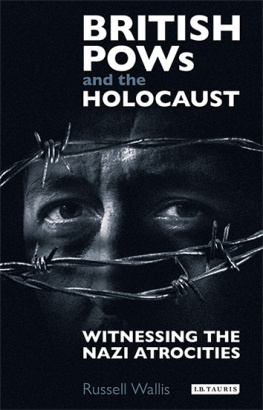
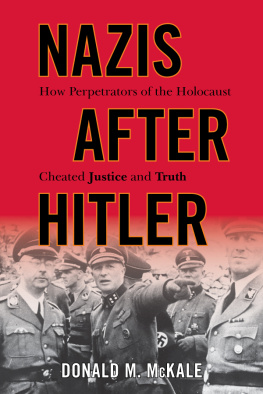
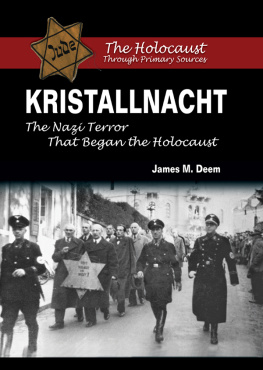
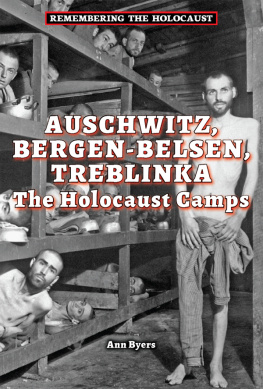
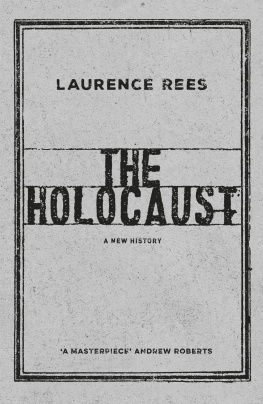
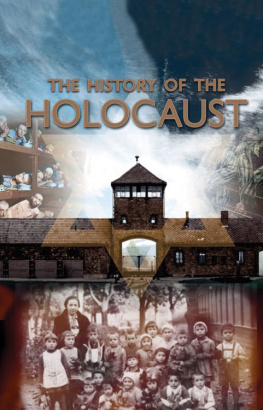
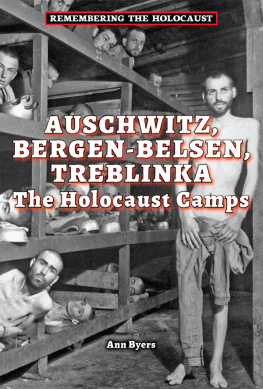
 The paper used in this publication meets the minimum requirements of American National Standard for Information SciencesPermanence of Paper for Printed Library Materials, ANSI/NISO Z39.48-1992.
The paper used in this publication meets the minimum requirements of American National Standard for Information SciencesPermanence of Paper for Printed Library Materials, ANSI/NISO Z39.48-1992.